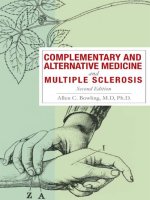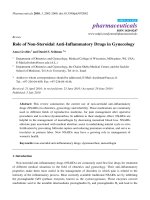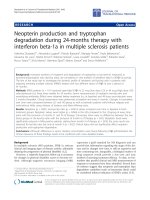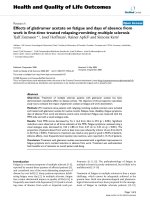Immunosuppressive drugs in multiple sclerosis
Bạn đang xem bản rút gọn của tài liệu. Xem và tải ngay bản đầy đủ của tài liệu tại đây (1.73 MB, 22 trang )
Dr Le Dinh Thi
Neurology Department
Summary
Multiplesclerosis(MS)is considered anautoimmune
disease associated with immune activity against
central nervous system antigens
Immunosuppression and immuno-modulation are
themainstays of the therapeutic strategies for this
disease: reduce frequency of relapses that are thought
to be a result of local inflammation and consequent
loss of the myelin sheath that normally surrounds
axons in the central nervous system
Immunosuppression
Methotrexate
2. Azathioprine
3. Cyclophosphamide
Immuno-modulation
1.
1. Methotrexate
Methotrexate is a potent immunosuppressant, whose
mode of action is predominantly through its inhibition
of dihydrofolate reductase (Calabresi 1990)
Longterm methotrexate administration is associated
with serious side-effects including hepatic fibrosis
(Colsky 1955).
It is important to establish the efficacy of
methotrexate, to ensure that people with MS are not
subject to longterm exposure with a potentially toxic
drug without good evidence of efficacy.
1. Methotrexate
T-cell
AND
synth
esis
MTX
Antiinflam
matory
Immu
nosup
pressi
ve
Oral Gray,Methotrexate for
multiple sclerosis,2004
2.Azathioprine
is a purine antagonist -> affects DNA replication and
the immune system in a number of ways.
It impairs T-cell lymphocyte function and is more
selective for T lymphocytes than for B lymphocytes
(Patel 2006). A recent study further elucidates the
efficacy of azathioprine in chronic inflammatory and
autoimmune disease
2.Azathioprine
Neurologists have been using azathioprine to treat
patients with MS for more than 30 years.
Although newer immunomodulating drugs, the
continuing high costs of these medications and their
uncertain effects on disability progression have
precluded the abandonment of azathioprine.
A review of seven clinical studies evaluating the effect
of azathioprine on MS up to 1989 concluded it was
efficacious in preventing relapses at one, two and
three years and had a slight, borderline benefit also on
prevention of disability progression at two and
three yeas (Yudkin 1991)
The few trials that assessed disability progression with
azathioprine found similar reductions to the
interferon trials (Sudlow 2003).
cost saving to the National Health Service, and
produced moderate quality of life gains (McCabe 2003)
A recent study has suggested that azathioprine seems
to be effective both on clinical and imaging outcomes
(Massacesi 2005). Azathioprine is approved and largely
used in Europe for MS treatment (Hommes 2004)
Ilaria Casetta,Azathioprine
for multiple sclerosis,2007
3. Cyclophosphamide (CFX):
An alkylant agent with cytotoxic and immunosuppressive
effects (Calabresi 1991)
Used in the treatment of different malignancies as well as
autoimmune diseases (Wegener’s granulomatosis,
Periarteritis nodosa, Lupus Erythematosus Systemic)
The efficacy of CFX in patients with progressive or
relapsing form of MS remains controversial (Schluep
1997, Weiner 2002): Different treatment schedules :
varying dosages, route of administration (i.e. oral,
intravenous), duration (ranging from a few days to
months) and association with other drugs (i.e.
adrenocorticotropic hormone-ACTH-steroids or other
immunosuppressive agents) or with plasma exchange,
followed or not by pulse maintenance treatment
LaMantiaL,Cyclophosphamid
e for multiple sclerosis,2007
4. Mycophenolate Mofetil
(MMF)
MMF is an expensive immunosuppressive agent that
has been used in the past few years for the prevention
of allograft rejection after renal, cardiac, or liver
transplant (Villarroel 2009).
It is increasingly used in the treatment of autoimmune
diseases such as MS (Etemadifar 2011; Frohman
2010; Remington 2010; Vermersch 2007)
MMF is well tolerated; the most frequently reported
adverse effects have been gastrointestinal (abdominal
pain, vomiting, diarrhea) or related to the
hematopoietic system
4. Mycophenolate Mofetil
Mycophenolate mofetil for relapsingremitting multiple sclerosis
Consumption
Azathioprine was efficacious in preventing relapses
and prevention of disability progression
MMF is well tolerated
Immunomodulators and
immunosuppressants for
multiple sclerosis
Immunomodulators and immunosuppressants
for multiple sclerosis: a network metaanalysis,2012
Referrence
LaMantiaL,MilaneseC,MascoliN,D’AmicoR,Weinstock-
GuttmanB.Cyclophosphamide for
multiplesclerosis.Cochrane Database of Systematic
Reviews 2007, Issue 1. Art. No.: CD002819
Ilaria Casetta,Azathioprine for multiple sclerosis,2007
Oral Gray,Methotrexate for multiple sclerosis,2004
Graziella Filippini ,Immunomodulators and
immunosuppressants for multiple sclerosis: a
network meta-analysis, 2012
Yousheng Xiao1, Mycophenolate mofetil for
relapsing-remitting multiple sclerosis,2014
THANK YOU FOR YOUR
ATTENTION









